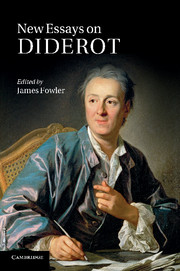Book contents
- Frontmatter
- Contents
- Notes on contributors
- Acknowledgements
- List of abbreviations
- Introduction
- PART I DIDEROT THE PHILOSOPHE
- PART II NOVELS
- 7 Les Bijoux indiscrets: transition or translation?
- 8 Jacques le fataliste et son maître: finding myself in the work of another
- 9 La Religieuse: Diderot's ‘Richardsonian’ novel
- PART III DIALOGUES
- PART IV PLAYS AND DRAMATIC THEORY
- PART V MUSIC, PERFORMANCE, AESTHETICS
- Select bibliography
- Index
- References
8 - Jacques le fataliste et son maître: finding myself in the work of another
Published online by Cambridge University Press: 11 April 2011
- Frontmatter
- Contents
- Notes on contributors
- Acknowledgements
- List of abbreviations
- Introduction
- PART I DIDEROT THE PHILOSOPHE
- PART II NOVELS
- 7 Les Bijoux indiscrets: transition or translation?
- 8 Jacques le fataliste et son maître: finding myself in the work of another
- 9 La Religieuse: Diderot's ‘Richardsonian’ novel
- PART III DIALOGUES
- PART IV PLAYS AND DRAMATIC THEORY
- PART V MUSIC, PERFORMANCE, AESTHETICS
- Select bibliography
- Index
- References
Summary
Jacques le fataliste et son maître (Jacques the Fatalist and his Master) is one of Diderot's works known in his lifetime to a few select readers, including those with access to the Correspondance littéraire (Literary Correspondence). On one level, it tells the story of Jacques and his master travelling through France towards an unstated destination, an eight-day journey enlivened by the servant's on–off account of his amours, culminating in his wooing of his true love. But the stories told by Jacques to his master are repeatedly interrupted by the events of the journey; this gives rise to intercalated narratives, as the travellers meet people with a story to tell; and the master–servant dialogue is itself contained in an exchange between reader and author (which introduces yet more stories). Diderot's novel is striking on many counts, but perhaps especially for what might be termed its two spheres of reference. On the one hand it is a novel about life that insistently returns to the question of whether Jacques's ‘fatalism’ (a word that covers both fatalism and determinism in the eighteenth century) adequately accounts for his/our experience of the world. On the other hand it is also a novel about the novel, indeed about story-telling in all its forms: about readers and writers, tellers and listeners. And it is about all these things above all by virtue of its ‘self-referential’ passages – those in which the text calls attention to itself as text, as artefact, as literature.
- Type
- Chapter
- Information
- New Essays on Diderot , pp. 113 - 126Publisher: Cambridge University PressPrint publication year: 2011



